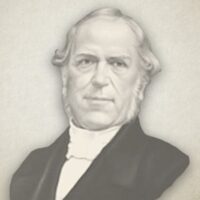
42 How Shall We Escape If We Neglect So Great Salvation?
In our texts are persons, subject and caution to be observed. And first, the persons: ‘For we which have believed do enter into rest,’ Heb 4:3. ‘For we are made partakers of Christ, if we hold the beginning of our confidence steadfast unto the end,’ 3:14. ‘But we are not of them that draw back unto perdition; but of them that believe to the saving of the soul,’ 10:39. ‘We have an altar, whereof they have no right to eat that serve the tabernacle,’ 13:10. ‘For here we have no continuing city, but we seek one to come,’ verse 14. From these portions, are we to conclude that the we in our text means the world? I think not.
Second, the subject, salvation. By this is meant the new testament ministration of the gospel of Christ, together with the important solemnities associated in it by the highest authority to the church of the living God, a 1,2; 11 1,2. That the ministry that God gave to the seed of Abraham, as a separate people from the heathen, by the hand of Moses, was solemn and important; but this by his SON to his elect church, is much more so; and also to the Jews as a nation, in a national way, as we shall in some other place observe, if opportunity will admit.
Third, the caution, ‘how shall we escape,’ &c. Paul himself was one included, and did he fear that he should fall from grace and perish at last, but for his own carefulness? Or to suit this text to the purposes of duty faith, did he hereby put himself upon a level in state with the unbelieving world? Certainly not, by the evidence of all his epistles. But there were many things to fear with a godly fear, and to be cautious of with a godly caution, and that at the chastening hand of God too, arising from the snares of evil many ways, and from a lukewarm, heartless neglect of the things of his honor, and of Christian peace and order in the gospel, see Rev ii, iii; and with such neglect of principles and practice, the Hebrews were not to expect to escape the like rebukes and chastenings. And as the Apostle wrote also to the Corinthian church 1 Cor x, observing that as God visited the sins of Israel, who were his church, in a figure as a body, so would he visit the follies of his true and living church with his rod, saying, ‘Now all these things happened unto them for ensamples, and they are written for our admonition, upon whom the ends of the world are come,’ verse 11.
And so he writes to this Hebrew church, saying, ‘I beseech you, brethren, suffer the word of exhortation,’ Heb 13:22. ‘See that ye refuse not him that speaketh. For if they escaped not who refused him that spoke on earth, much more shall not we escape, if we turn away from him that speaketh from heaven, 12:25. There were those who had professed to receive the faith of the gospel of Christ, in love and in newness of life, ‘who had turned back from their profession, and treated the name of Christ with contempt, and his blood as that of a criminal only, and so (as an unholy thing,’ Heb 10:29, with much subtlety and lofty pretension; and whom the heaviest judgments of God awaited, more than as though they had never professed the Christian name, 2 Peter 2:20-22. And against the snares and wicked cunning of these, the apostle cautions this church, saying, ‘Cast not away, therefore, your confidence,’ 10:35; ‘Let us hold fast the profession of our faith, without wavering,’ 10:23. ‘Be not carried about with divers and strange doctrines,’ 13:9. And as the apostle Peter saith, ‘Ye therefore, beloved seeing ye know these things before, beware lest ye also be led away with the error of the wicked, and fall from your steadfastness,’ 2 Peter 3:17. This is evidently the truth and intent of our text, while it has no more to do with the notion of the duty of natural men to believe unto salvation, than it has to do with the duty of saints to become angels, and of devils to become saints; and if you cannot get better support than the three texts we have just noticed, for your duty faith unto salvation, it is a horrid rotten concern altogether, and you must look out some new ground on which to make your own assertion good, that ‘Duty faith is taught in the word of God.’
John Foreman (1792-1872) was a Strict and Particular Baptist preacher. He was appointed the Pastor of Hill Street Chapel, Marylebone, serving this position for close to forty years.
JOHN FOREMAN'S LIFE AND MINISTRY
JOHN FOREMAN ON DUTY FAITH (COMPLETE)
JOHN FOREMAN'S BAPTISM AND COMMUNION CONSIDERED (COMPLETE)




